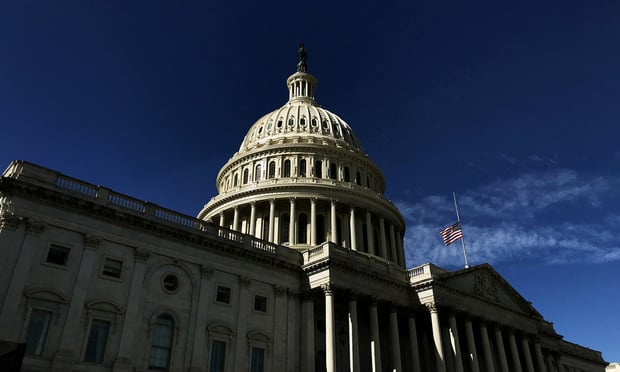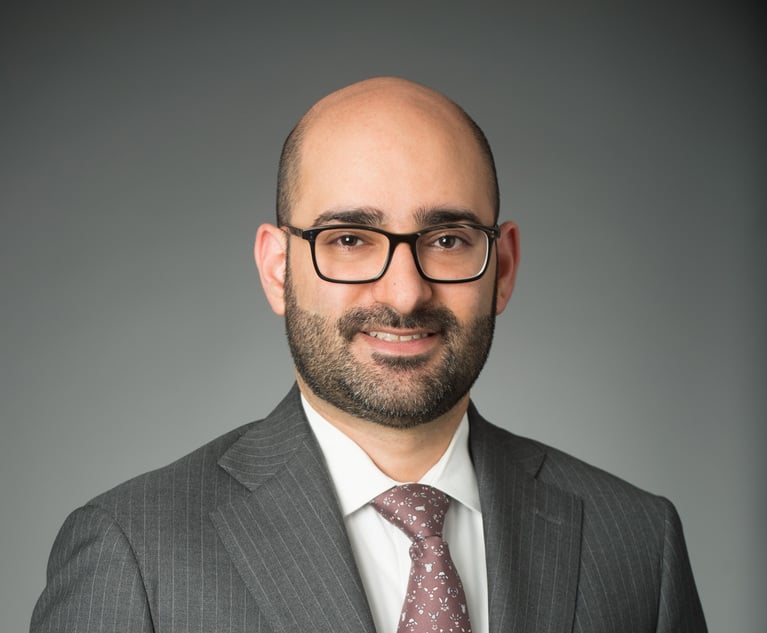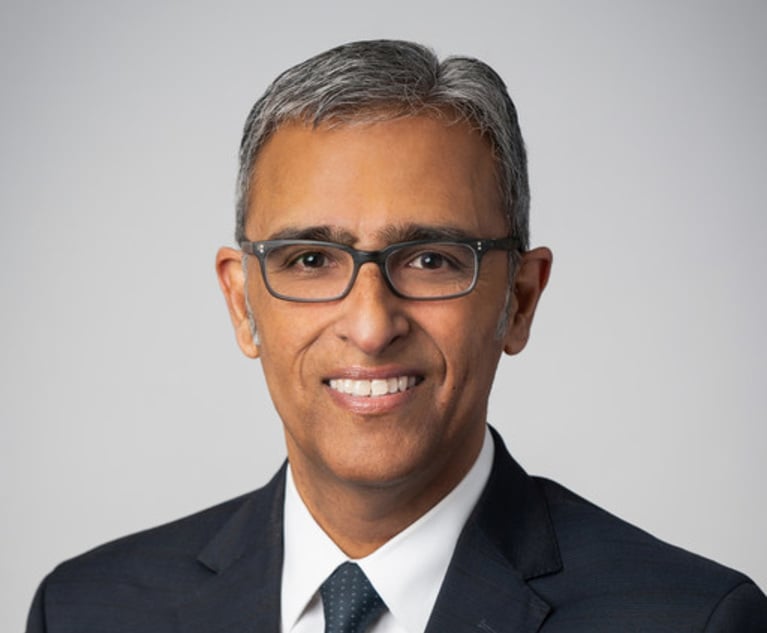DC Bar Eyes Revamping Law Firm Ownership Rules
Washington, D.C., is already the sole jurisdiction in the U.S. that allows nonlawyers to partner in law firms. Now a bar committee will consider going even farther.
January 24, 2020 at 12:25 PM
3 minute read
 U.S. Capitol building in Washington, D.C. Feb. 8, 2019. Photo: Diego M. Radzinschi/ALM
U.S. Capitol building in Washington, D.C. Feb. 8, 2019. Photo: Diego M. Radzinschi/ALM
As a growing number of states mull allowing nonlawyers to take ownership stakes in law firms, Washington, D.C., is ahead of the curve.
The nation's capital is already the sole U.S. jurisdiction to allow lawyers to partner with nonlawyers. While these partnerships are subject to certain limitations, a D.C. bar committee announced Thursday that it would look into an even less restrictive model.
To that end, the D.C. Bar Global Legal Practice Committee has announced it will be taking public comments on its current system and potential changes until March 9.
The announcement specifically mentions "alternative business structures" and "multidisciplinary practice" as areas of interest. The former refers to the model in place in the U.K. allowing businesses that provide legal services to receive licenses enabling outside ownership or nonlawyer investment. The latter references a type of Alternative Business Structures (ABS) firm that provides both legal and nonlegal services.
The current D.C. rule governing nonlawyer ownership, a modification of the American Bar Association's model rule 5.4(b), has been in place since 1991. It allows lawyers to practice law in a firm that has nonlawyer partners, provided the nonlawyers provide professional services in the firm, the firm solely offers clients legal services, and nonlawyers follow the rules of professional conduct.
The Global Legal Practice Committee wants to hear specifically from D.C. firms that already have nonlawyer partners to learn if its existing rules have made it easier to retain professionals including medical doctors or nurse practitioners, mental health experts, economists, lobbyists, accountants and law firm managers. The committee is also curious about client demand for a wider range of professional services, and whether firms have lost business because of their inability to deliver these services.
It's also asking for input about how firms might be able to benefit from sharing fees with nonlawyers, and whether this sort of outside investment would allow greater innovation through technology use or increased financial stability.
Another line of inquiry is into how a rules change would impact firms that currently work with third-party litigation funders, or are curious about doing so.
The committee also wants to explore what type of regulatory structure would work best for non-lawyers working within law firms.
In California, Utah and Arizona, state bar task forces have all begun exploring similar changes to attorney regulation, and Chicago's bar association announced a task force of its own in the fall.
At its February midyear meeting in Austin, Texas, the American Bar Association's House of Delegates will also consider a resolution that would encourage jurisdictions across the U.S. to experiment with new regulatory models.
Read More
This Insider Says It's Time for Big Changes in California's Legal Industry
California Lawyers Slam Bar Proposals for Fee-Sharing, Nonattorney Ownership
This content has been archived. It is available through our partners, LexisNexis® and Bloomberg Law.
To view this content, please continue to their sites.
Not a Lexis Subscriber?
Subscribe Now
Not a Bloomberg Law Subscriber?
Subscribe Now
NOT FOR REPRINT
© 2025 ALM Global, LLC, All Rights Reserved. Request academic re-use from www.copyright.com. All other uses, submit a request to [email protected]. For more information visit Asset & Logo Licensing.
You Might Like
View All
How Some Elite Law Firms Are Growing Equity Partner Ranks Faster Than Others
4 minute read
Fried Frank Partner Leaves for Paul Hastings to Start Tech Transactions Practice
3 minute read
Weil Adds Acting Director of SEC Enforcement, Continuing Government Hiring Streak
3 minute read
Law Firms Look to Gen Z for AI Skills, as 'Data Becomes the Oil of Legal'
Trending Stories
- 1'Lookback Window' Law for Child Abuse Cases Constitutional, State High Court Finds
- 2Troutman Pepper Says Ex-Associate Who Alleged Racial Discrimination Lost Job Because of Failure to Improve
- 3Texas Bankruptcy Judge Withdraws Ethics Complaint Against Jackson Walker
- 4Apply Now: Superior Court Judge Sought for Mountain Judicial Circuit Bench
- 5Harrisburg Jury Hands Up $1.5M Verdict to Teen Struck by Underinsured Driver
Who Got The Work
J. Brugh Lower of Gibbons has entered an appearance for industrial equipment supplier Devco Corporation in a pending trademark infringement lawsuit. The suit, accusing the defendant of selling knock-off Graco products, was filed Dec. 18 in New Jersey District Court by Rivkin Radler on behalf of Graco Inc. and Graco Minnesota. The case, assigned to U.S. District Judge Zahid N. Quraishi, is 3:24-cv-11294, Graco Inc. et al v. Devco Corporation.
Who Got The Work
Rebecca Maller-Stein and Kent A. Yalowitz of Arnold & Porter Kaye Scholer have entered their appearances for Hanaco Venture Capital and its executives, Lior Prosor and David Frankel, in a pending securities lawsuit. The action, filed on Dec. 24 in New York Southern District Court by Zell, Aron & Co. on behalf of Goldeneye Advisors, accuses the defendants of negligently and fraudulently managing the plaintiff's $1 million investment. The case, assigned to U.S. District Judge Vernon S. Broderick, is 1:24-cv-09918, Goldeneye Advisors, LLC v. Hanaco Venture Capital, Ltd. et al.
Who Got The Work
Attorneys from A&O Shearman has stepped in as defense counsel for Toronto-Dominion Bank and other defendants in a pending securities class action. The suit, filed Dec. 11 in New York Southern District Court by Bleichmar Fonti & Auld, accuses the defendants of concealing the bank's 'pervasive' deficiencies in regards to its compliance with the Bank Secrecy Act and the quality of its anti-money laundering controls. The case, assigned to U.S. District Judge Arun Subramanian, is 1:24-cv-09445, Gonzalez v. The Toronto-Dominion Bank et al.
Who Got The Work
Crown Castle International, a Pennsylvania company providing shared communications infrastructure, has turned to Luke D. Wolf of Gordon Rees Scully Mansukhani to fend off a pending breach-of-contract lawsuit. The court action, filed Nov. 25 in Michigan Eastern District Court by Hooper Hathaway PC on behalf of The Town Residences LLC, accuses Crown Castle of failing to transfer approximately $30,000 in utility payments from T-Mobile in breach of a roof-top lease and assignment agreement. The case, assigned to U.S. District Judge Susan K. Declercq, is 2:24-cv-13131, The Town Residences LLC v. T-Mobile US, Inc. et al.
Who Got The Work
Wilfred P. Coronato and Daniel M. Schwartz of McCarter & English have stepped in as defense counsel to Electrolux Home Products Inc. in a pending product liability lawsuit. The court action, filed Nov. 26 in New York Eastern District Court by Poulos Lopiccolo PC and Nagel Rice LLP on behalf of David Stern, alleges that the defendant's refrigerators’ drawers and shelving repeatedly break and fall apart within months after purchase. The case, assigned to U.S. District Judge Joan M. Azrack, is 2:24-cv-08204, Stern v. Electrolux Home Products, Inc.
Featured Firms
Law Offices of Gary Martin Hays & Associates, P.C.
(470) 294-1674
Law Offices of Mark E. Salomone
(857) 444-6468
Smith & Hassler
(713) 739-1250










